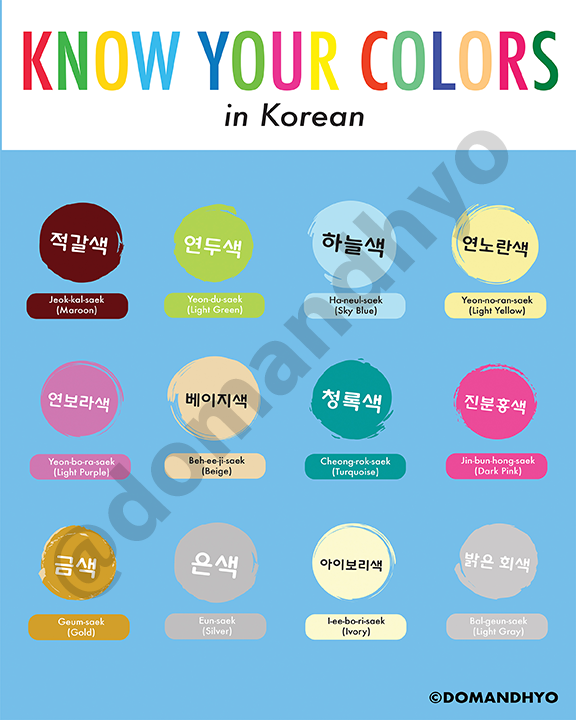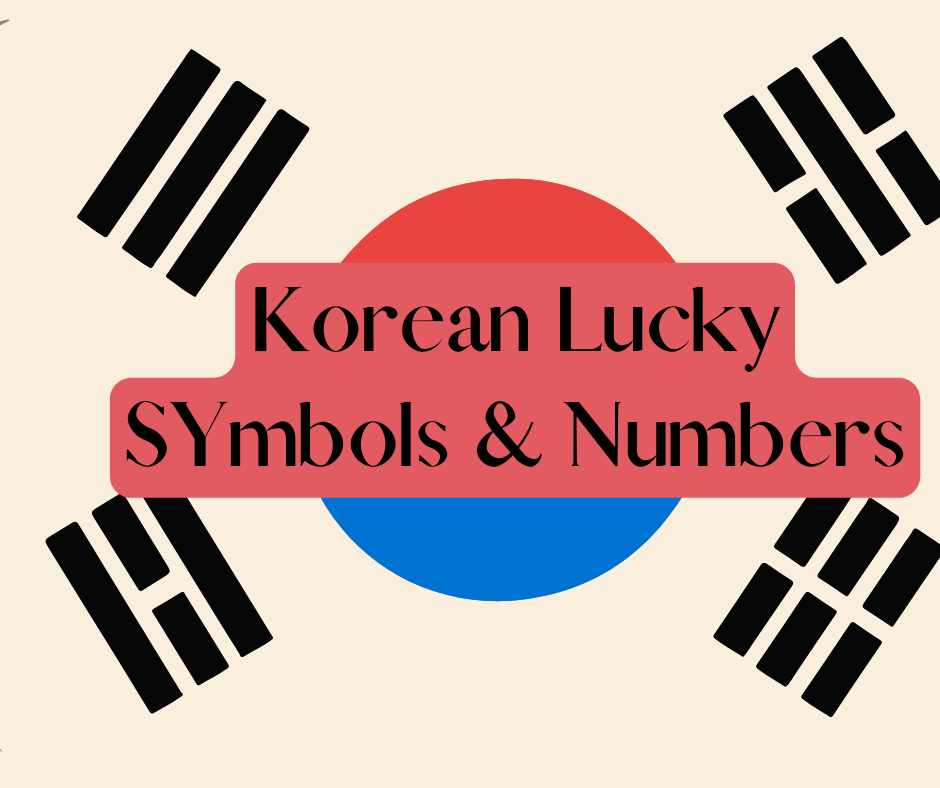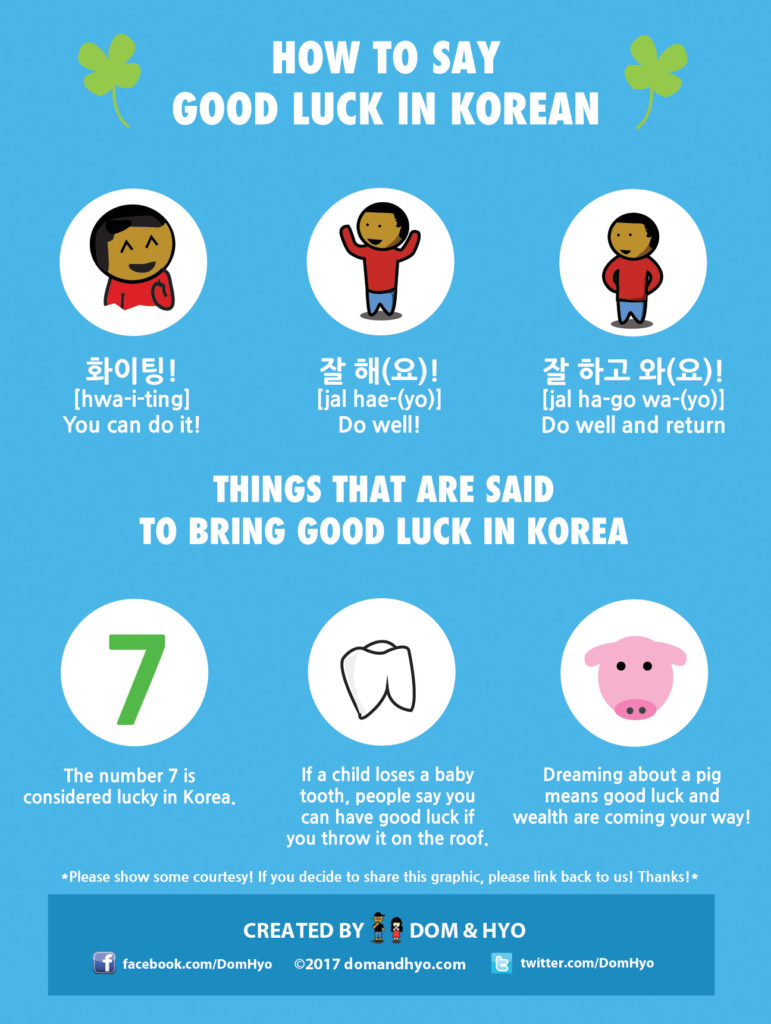Luck in Korean Language Hangul Korean Posters and Art Prints TeePublic
BAD LUCK - Translation in Korean - bab.la Translation for 'bad luck' in the free English-Korean dictionary and many other Korean translations. bab.laarrow_drop_down bab.la - Online dictionaries, vocabulary, conjugation, grammarToggle navigationshare Translator Dictionary Conjugation Examples Phrasebook Word Finder

27 How To Say Good Luck In Korean 11/2023 Interconex
Color Red While red is a vibrant and popular color in many cultures, it's actually considered unlucky in Korea. This is because red is often associated with blood, danger and warning signs. Red ink is also avoided in Korea as it's believed to bring bad luck, particularly when used to write someone's name. Funeral Processions

How to say, How do I say, Good luck in Korean? YouTube
1. Shaking Your Legs 2. Whistling at Night Summons Spirits 3. Dreaming of Pigs Brings Wealth 4. The number four 5. Fan Death 6. Eating Seaweed Soup is Good Luck on Your Birthday 7. Don't Wash Your Hair on New Year's Day 8. Gifting your partners shoes will make them run away 9. Never write your name in red ink 10. Move on a Lucky Day 11.

Good Luck In Korean Language Colors In Korean Learn Korean With Fun Colorful Infographics Dom
There are a few ways to wish someone good luck in Korean. You can say the Korean words 잘봐요 (jalbwayo), 잘봐 (jalbwa), or 화이팅 (hwaiting). What Korean word to use will depend on the context and the formality or who you're talking with. "Good Luck" in Korean (Formal) The formal version of "Good Luck" in Korean is 잘보세요 (jal boseyo).

The Best 18 Good Luck In Korean Hangul basequoteglide
#4. Number 4 is bad luck. Number 4 is believed to be bad luck. You will find many elevators in Korea have the number 4 replaced with the letter F. #5. Giving shoes to your lover will cause them to run away. Giving shoes to your significant other could cause them to run away.

Good Luck In Korean Language Colors In Korean Learn Korean With Fun Colorful Infographics Dom
Now, let me show you some formal ways to wish someone good luck in Korean. One common expression is '행운을 빕니다' (haeng-un-eul bim-ni-da), which translates to 'I wish you good luck.'. Another phrase you can use is '행운 가득하길 바랍니다' (haeng-un ga-deuk-ha-gil ba-rab-ni-da), meaning 'I hope you are filled.

How To Say Good Luck In Korean (Not 좋은 운) YouTube
1. Eating Yeot Yeot is a type of sticky and sweet Korean candy made from glutinous rice. Because it is so sticky it is believed that good fortune will stick on to you. Also Koreans students usually eat this before an exam so that all the knowledge sticks into their heads! Source: gwangjublog 2. Shaking your legs

Bad luck KDrama Amino
How to say bad luck in Korean Korean Translation 불행 bulhaeng More Korean words for bad luck 불행 noun bulhaeng misfortune, misery, unhappiness, adversity, woe Find more words! bad luck See Also in English luck noun 운, 수 bad noun, adjective, adverb 나쁜, 나쁘게, 심한, 나쁜 것, 해로운 bring bad luck 불운을 가져오다 have bad luck 불행을 겪다 be bad luck 불행이되다. Similar Words

BAd LUCK IN KOREA ! 17 CREATES ! ITS MY BADLUCK 😯 YouTube
Here is the translation, pronunciation and the Korean word for bad luck: 불행. [bulhaeng] Bad luck in all languages.

Korean Lucky Symbols & Numbers Fascinating cultural exploration Live Learn Venture
Using the power of light is a way to drive away bad luck in your home. Turn on all the lights in the house and light three candles to keep bad spirits from hiding inside. Two of the candles should be white, symbolizing purity and preventing bad luck, and the other candle should be orange, symbolizing a change of fate.

Korean Superstitions That Just May Save Your Life Curious what's considered good and bad luck in
The number 4 is a symbol of bad luck. In elevators, the letter F indicates the fourth floor instead of the number 4. The pronunciation of the number 4 sounds similar to the word '死' which means death in Chinese characters. In China and Japan, the number 4 is also associated with misfortune or death. [8]

Good Luck In Korean Language Colors In Korean Learn Korean With Fun Colorful Infographics Dom
Korea has a long history of superstitions related to good and bad luck. Some of the most common unlucky beliefs include avoiding the number four, black cats, broken mirrors, red ink, whistling at night, pointing at graves, giving shoes as gifts, opening umbrellas indoors, chopstick superstitions, certain birthdays, and the direction of one's bed. These superstitions are deeply ingrained in.

Learning Korean / greetings / good luck Aprender coreano, Coreanas, Corea
1. May the 4th Be Bad: The number four is considered bad luck and has origins in China where the number four sounds similar to the word "death".In Korean elevators, and other relevant places where a four would commonly be seen, the number is replaced with the letter "F" rather than having the numeral scaring unsuspecting elevator users.

27 How To Say Good Luck In Korean 11/2023 Interconex
Good Luck (Informal) - 잘봐 (Jalbwa) Example Sentence: 오늘 시험 잘봐! (oneul sihom jalbwa) - See today's exam well!/Good luck with today's exam! Another way of saying Good luck in Korean is 잘봐 (Jalbwa). Please remember that this is a very informal phrase, so you might want to use it to just friends or people the same age as.

The Best 10 Good Luck In Korean basequoteglide
1.10 Eating 엿 (yeot) Brings Good Luck 1.11 Avoid Jumping Over Your Baby 1.12 Don't Touch Your Eyes After Touching a Butterfly 1.13 Korean Good Luck Charms 1.14 Korean Lucky Numbers 2 Wrap Up Korean Superstitions List Although not everyone believes these superstitions, most people do know about them.

Luck in Korean Language Hangul Korean Posters and Art Prints TeePublic
The concept of both good and bad luck is prominent around the world—especially in Asian cultures, says Sydney Chinchanachokchai. In Korean culture, this belief in superstition is alive and well. This is clearly evidenced by the notion that certain numbers are luckier than most.